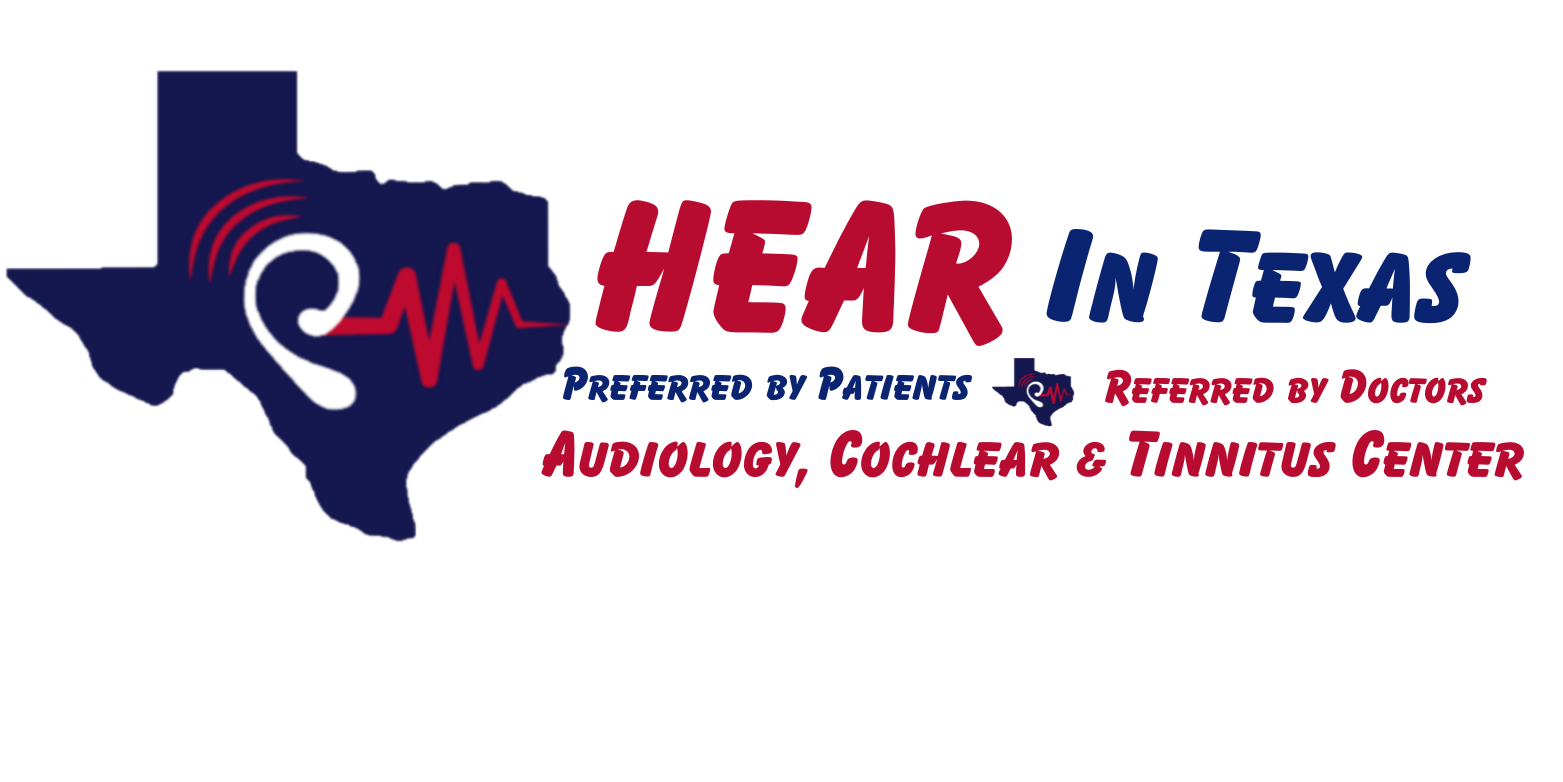HEAR IN TEXAS
Advanced Hearing Aid Technology
Enormous Benefits Delivered By Advanced Prescription Hearing Aid Technology
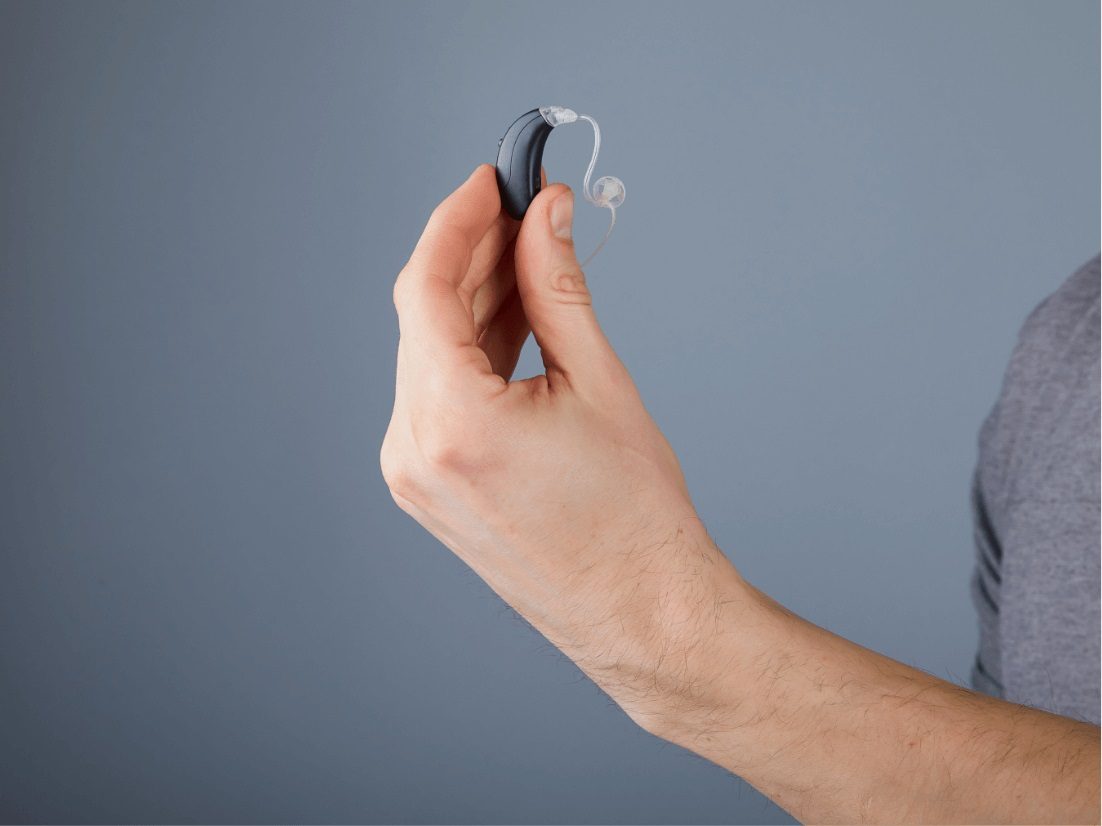
Are you like most people who cling to an outdated stigma of prescription hearing aids that is based on the ugly, bulky, and frustrating devices your parents or grandparents used to wear? You can ditch that idea because today’s hearing aid technology is worlds away from what it was.
Similar to the innovations included in your smartphone, hearing technology has rapidly progressed over the past decade, allowing manufacturers to produce devices that are smaller, lighter, more stylish, and discreet, even invisible, without sacrificing processing power. Other features of modern hearing aids include natural sound clarity, the capacity to control background noise, include advanced features like long-lasting rechargeable batteries, and the capacity to link other digital devices, like your cellphone, television, and computer, to your hearing device.

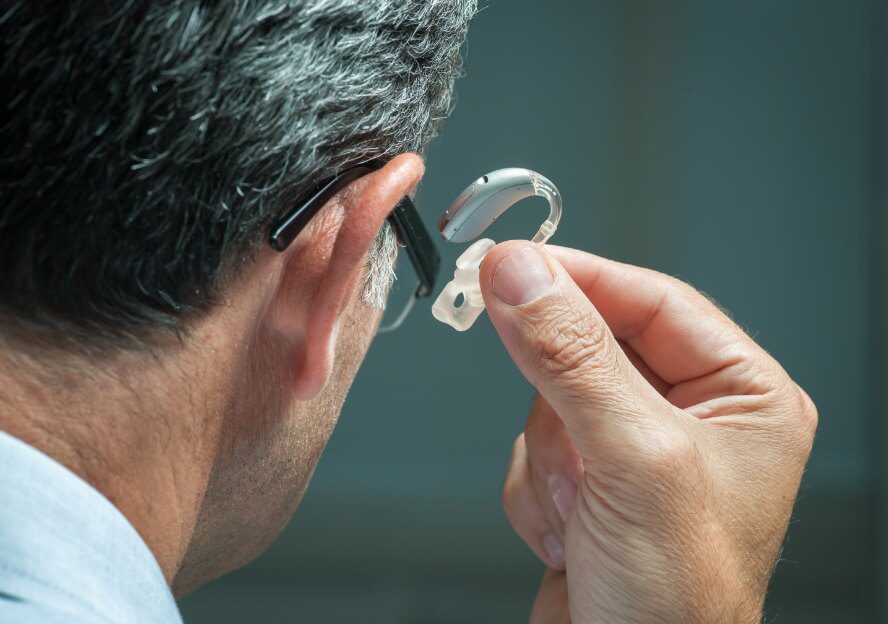
Hear In Texas Partners With Major Hearing Aid Manufacturers

The choices we offer our patients include a broad range of technologies from brand-name manufacturers, like:
• Resound (distribution and repair)
• Starkey (distribution and repair)
• Widex (distribution and repair)
• Phonak (distribution and repair)
• Signia (distribution and repair)
• Oticon (distribution and repair)
• Jabra (distribution and repair)
With so many available options, you’ll appreciate the help our hearing aid specialist can provide when it comes time to choose the device that best fits your needs and lifestyle.
Is Your Loved One Living With Hearing Loss?
“At our halloween party, the family is outside and we’re interacting, and mom is just sitting there”
“If you’re out there waiting to get your hearing checked, I would say you’ve waited how many months or years, you’ve waited too long! You need to get your hearing checked, not only because it’s very good to hear again, but the testing will show you that it’s great for your mind!”
Our Hearing Aid Specialist Can Help You Choose
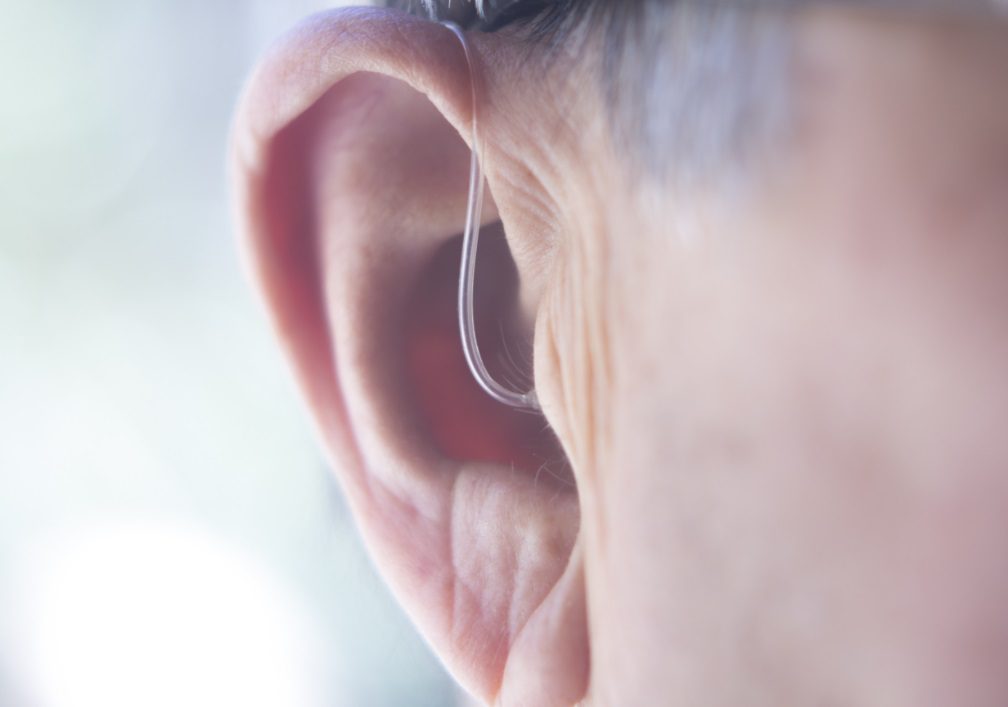
Because today’s technology also makes it possible for hearing aids to come in a variety of different sizes and colors, costs, designs, levels of technology, and features, you might be overwhelmed by all the available choices. To help put your mind at ease, our hearing aid specialist is eager to guide you through the selection process by helping you consider your needs and preferences, such as:
• Power requirements necessary to address your specific level of hearing loss
• Your manual dexterity and visual capabilities
• The budget you have to work with
• Wearing discretion and cosmetic concerns
• Skin sensitivities
• Anatomical/medical considerations

FAQs About Hearing Aids
Q. How Will I Know If I Need A Hearing Aid?
Your family may have noticed you are struggling with your hearing and are advising you to have your hearing checked. Struggling to communicate well with others, keeping up with your typical lifestyle, and frustration when it comes to enjoying conversations in a noisy restaurant or at a social event are other indicators, but the only way to know the truth is to consult an audiologist for a professional, comprehensive hearing assessment.
Q. Will A Hearing Aid Cure My Hearing Loss?
No. Hearing aids are “aids,” which means they help make it easier to hear through sound processing and amplification, but they cannot restore the natural functioning of your ear. Hearing aids do slow down the progression of deterioration as well as prevent cognitive decline and help correct issues with balance and vertigo.
Q. How Long Will My Hearing Aid Last?
The typical hearing aid lasts between five to six years. With plenty of TLC, regularly scheduled maintenance, tune-ups, and repair, you can extend their life, but most audiologists recommend upgrading every five years in order to take advantage of the newest available technologies in a rapidly changing industry.
Q. Do Hearing Aids Use Special Batteries?
Yes. Most modern hearing aids use zinc-air batteries made specifically for hearing aids. They come in a variety of sizes to fit different devices, but most are easy to find in pharmacies and grocery stores.
Q. How Long Do Hearing Aid Batteries Last?
There are a lot of variables involved in determining the service life of a hearing aid battery, such as the type of battery, how many hours per day you wear your hearing aid, the presence of moisture, and battery quality. Weekly change is common with smaller batteries, while larger batteries can last two to three weeks.
Q. How Long Does It Take To Get Used To A Hearing Aid?
Accurately predicting how you are going to adapt to your hearing aids is difficult because each person’s experience is unique. New sounds and amplification shock the central auditory system of your brain, requiring time to acclimate and relearn how to process information it has never heard before or has not heard for a long time.
As a rule of thumb, most manufacturers allow a 60-day trial period, which is ample time for most people to adjust to their hearing aids and evaluate their benefits. During this time, coping strategies, ongoing adjustments, and support all help speed up the process.
Q. Why Do Hearing Aids Cost So Much?
Several factors contribute to the cost of hearing aids. Hearing aids are sold in relatively low volume (about 1.7 million hearing aids for some 30 million people with hearing loss), which means that manufacturers must sell them at a higher cost to recuperate production costs. The amount of time and money spent by manufacturers on research and development, which is considerable, are among the costs of production, and the industry-standard one to two-year warranty for replacement and repairs also affects the purchase price.
Prescription Hearing Aid Styles
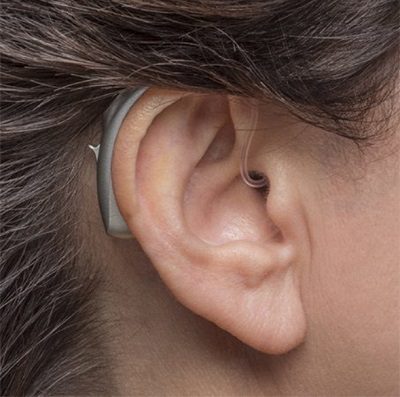
Behind-the-Ear (BTE)
Though BTE hearing aids look like older analog hearing aids, don’t let that fool you. Besides being lighter and more streamlined, their digital processing power far exceeds that of their ancestors. Enhanced by custom-formed earmolds for a more comfortable fit and open-canal earpieces that eliminate the “plugged up” feeling some users experience, BTE hearing aids are the most flexible, adaptable, and powerful hearing instruments available for all levels of hearing loss.
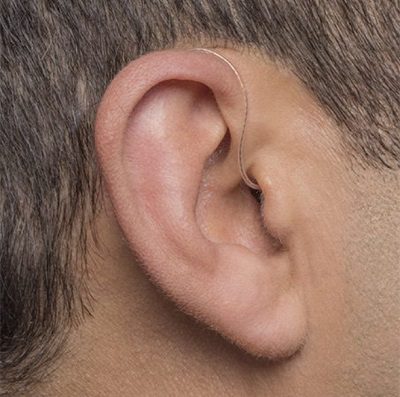
Mini BTE
Similar to their bigger brother, Mini BTEs come with a smaller case and use ultra-thin tubing to discreetly route sound into the ear. The soft tip at the end of the tubing sits in the ear canal but doesn’t occlude it, producing a more natural, open feeling as airflow and sound enter the ear naturally, while amplified sound enters through the tip. “Open fitting” works best for individuals with mild to moderate high-frequency losses.
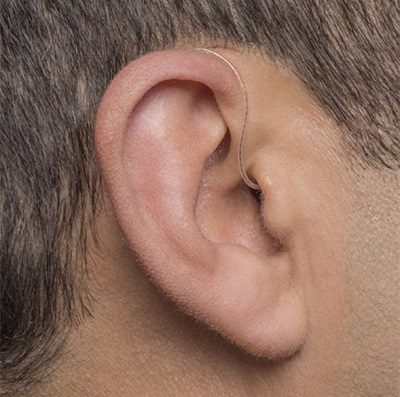
Receiver-in-the Ear (RITE)
RITE hearing aids are modified BTE devices that feature a comfortable, open-fit design suited for nearly all types of hearing loss. The main difference involves locating the speaker of the instrument in the ear tip instead of in the main BTE body of the instrument. Similar to the Mini BTE, they are smaller and lighter weight but pack powerful technology to serve those with mild to severe hearing loss.
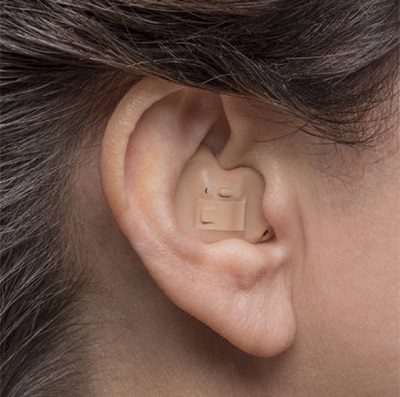
In-the-Ear (ITE)
ITE instruments combine technology and speaker inside a molded plastic shell that fits the contours of your outer ear canal. Full-shell in-the-ear technology produces powerful, clear sound for all degrees of treatable hearing loss and works well for those who wear glasses or use an oxygen cannula. The ease of adjustment, larger batteries with a longer life, rechargeability, and device connectivity are among the advantages of ITE ove
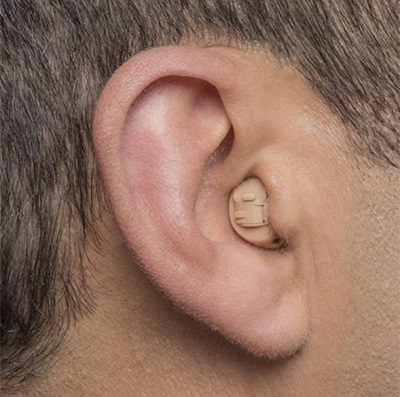
In-the-Canal (ITC)
Smaller versions of ITE devices, ITC hearing aids are custom-molded to fit further into the ear canal instead of the outer ear area. They provide the same benefits of ITE users who wear glasses, an oxygen cannula, or hats but allow you to be a bit more active and offer greater wearing discretion. Individuals with mild to moderate hearing loss can benefit from this style, which includes the capacity to customize external controls to fit your needs.
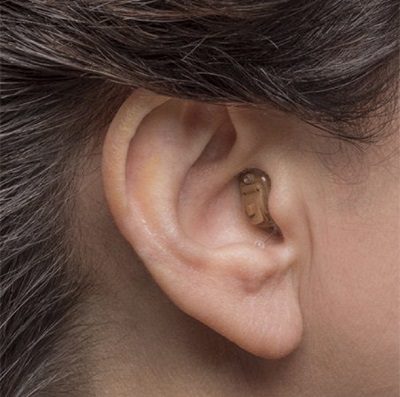
Completely-In-The-Canal (CIC)
Going deeper still, CIC devices fit deeper into the ear canal than ITC devices and require a tiny clear plastic post to insert and remove them. This can present a challenge to individuals who lack fine-dexterity. Comfortable and discreet, CIC devices provide a snug fit ideal for activity-filled days with friends and family, the reduction of wind interference for more natural hearing, and greater clarity without sacrificing too much when it comes to processing power.
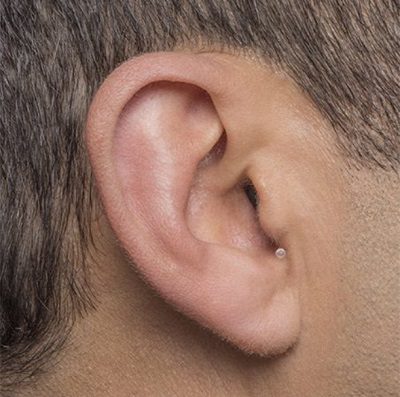
Invisible-In-the-Canal (IIC)
Custom molded to fit snugly near the second bend of the ear canal, IIC hearing aids are 100% invisible, digital, and fully programmable. They pack plenty of clarity and power into the tiniest of packages, providing the highest level of wearing discretion and serving those with a very active lifestyle. Individuals with all but the most severe degrees of hearing loss qualify for this style of device.
Helping You to Choose the Right Hearing Technology through our Partnerships with all Manufacturers
With each level of hearing loss and person that we help having their own unique set of circumstances, there is never a “one size fits all” approach.
That’s why we partner with every hearing aid manufacturer to ensure that we can always find the right solution for your unique needs.
This also means that we’re often front of the queue to get our hands on the latest hearing technology to ensure that you always have access to the latest developments.
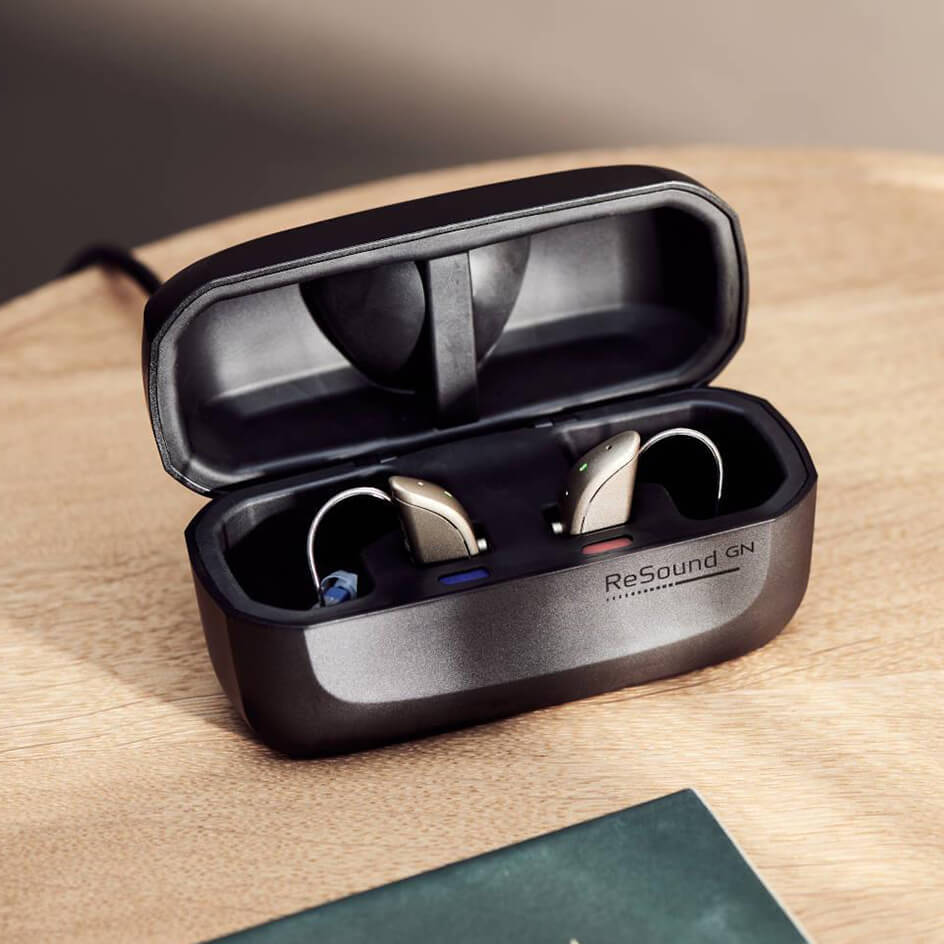
Hearing Health Resources
Latest News

How Hear in Texas Supports Veterans With Hearing Loss
Honoring Veterans With Accessible Hearing Care
At Hear in Texas, we hold a deep appreciation for the sacrifices that veterans have made for our country. As a veteran-owned business, we are committed to serving those who have served us by providing accessible, personalized hearing care.
Our commitment extends beyond mere acknowledgment—we aim to be a cornerstone of support for veterans in managing and overcoming the challenges of hearing loss.
Partnered With the VA: What That Means
Our partnership with the Department of Veterans Affairs (VA) positions us as a VA-authorized community care provider. This collaboration allows us to deliver specialized auditory care that’s finely tuned to the lifestyle and healthcare needs of veterans across Texas.
Every veteran deserves a service provider who understands their experiences and lifestyle nuances, which is why our services are not just about treating hearing issues, but about holistic health improvement.
Eligibility and Referral Process
Navigating healthcare can sometimes be daunting, soour referral processhas been crafted to be as seamless as possible for our veterans.
Request an Audiology Referral to a CCN Provider
Begin by requesting a referral within the VA system for audiology care.
Contact your primary care provider, VA healthcare team, or the Community Care Network, or visit MyHealth.VA.gov to request a referral online.
Hear in Texas Is Your Authorized CCN Provider
As a credited member of the Community Care Network (CCN), we’re poised to offer care once your referral is approved.
CCN Provider: Dr. Celia Miranda (“Dr. Sally”)
NPI #: 1639391451
Location: 2967 Oak Run Pkwy Suite #315, New Braunfels, TX 78132
Schedule Your Appointment With Hear in Texas
With your referral number ready (usually provided in two to three days), call Hear in Texas to arrange your appointment.
You can also opt for the VA healthcare team to schedule this for you at (210) 949-9702.
Receive Your Authorization Letter
After your appointment is confirmed, you’ll receive an authorization letter. This document includes critical details such as the authorization number, information about your approved in-network community provider, and a description of the approved care.
Attend Your Appointment
It’s important to bring your authorization letter, alongside any relevant medical records, to your appointment at Hear in Texas.
What Services Are Offered to Veterans?
Our dedicated services cover a spectrum of hearing health needs to address issues unique to veterans.
Positional Vertigo Management: Understand and manage balance disorders.
Tinnitus Management: Alleviate ringing or noise perception in the ears with our tailored management plans.
Hearing AidsandDevice Repairs: We offer a full suite of hearing aids and assistive devices, backed by repair and maintenance services.
Earwax Removal: Professional care in the removal of cerumen, ensuring auditory health and comfort.
NEXUS Letters: Specialized documentation supporting disability claims related to hearing loss.
Hearing Assessments: Comprehensive testing to track and diagnose hearing capabilities.
Cochlear Implants: When hearing aids aren’t enough, the latest implants can provide significant improvement.
Cognitive Screening: Evaluate cognitive functions affected by hearing loss for an integrated health approach.
Benefits of Choosing Hear in Texas
As a veteran and family-owned clinic,our team of expertsis deeply rooted in the values of integrity, trust, and community spirit.
Ultramodern technology combined with partnerships with leading hearing aid manufacturers guarantees the highest quality care tailored to your needs.
Your unique requirements are put first in every interaction, and you can rest assured we’re committed to supporting your hearing health journey withcomprehensive, long-term solutions.
How to Get Started
Get in touch with our team today and enhance your connection with the world around you!
Request a callbackto talk to our team about any questions or concerns or call us directly at(830) 360-2000.
A Hearing Assessment Is Critical To Choosing The Right Hearing Aid
The prevalence of hearing aid dispensers, as well as the capacity for people to self-diagnose and self-treat by purchasing an OTC or online hearing device, has increased the potential to cause severe damage to your hearing with a poor-fitting, improperly programmed device. Your safer option is to consult a hearing care professional for a hearing assessment.
If you’d prefer a hearing instrument that will solve your hearing challenges rather than exacerbate them, submit the adjacent form in order to schedule a hearing assessment with our professional Hear in Texas audiologist.
© Copyright 2025 Hear in Texas. All Rights Reserved. Designed by Topline








